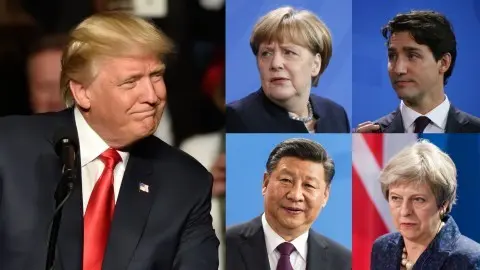A long, hot summer…
The next few weeks present a number of political challenges that could upset global economic growth and financial market confidence. President Trump continues to ratchet up the rhetoric on trade as he aims to squeeze maximum concessions from Europe and China, but he risks pushing too far as retaliation measures escalate. At the same time, European politics will remain in the headlines as Brexit talks go in circles and Italy potentially tests the EU’s patience
US growth appears to be bouncing back sharply in 2Q18, with households and businesses seemingly brushing aside trade war fears and higher fuel and borrowing costs. The jobs market is in great shape and is supporting confidence and spending, leaving the Federal Reserve on course to hike interest rates three more times this year.
Nonetheless, how President Trump proceeds on trade will be critical for both the outlook for US growth and the US political situation. The Republicans continue to lag behind in opinion polls, which means there is a strong probability the Democrats could win control of Congress. This will make passing Trump’s legislative agenda much more challenging while raising talk of his potential impeachment.
As for the Eurozone, both Italian and Spanish politics offered some drama over the last few weeks, and the current calm should not be taken for granted. On the international scene, trade tensions are not abating yet, an important threat to Eurozone export industries. Eurozone growth is still OK, but not more than that. That means that the ECB’s exit from its easy monetary policy will be extremely slow, even though inflation has picked up.
In the UK, the Bank of England is probably leaning more towards an interest rate rise in August than markets expect. But here again, the economic data risk being overshadowed by politics, as the UK debate over exiting the EU gets increasingly messy. The government is split over two proposed ways forward on trade, and in any case, the EU has already cast doubt on both.
We think that the US trade disagreement with China not only reflects a desire to reduce the trade deficit but also concerns about the rise of China and the perceived threat its “Made in China 2025” policy could spell for the US high-tech industry. As China opens up a range of markets to the world, the US risks being shut out as other countries build stronger trade ties in areas such as agriculture and energy.
In Japan, the first quarter slowdown was likely only a pause, nothing more. We anticipate activity strengthening through the second quarter – barring disasters, such as an all-out trade war.
Having been hit hard by Italian politics, the EUR is trying to make a come-back – helped by speculation over the end-point of ECB QE. Politics, global trade policy, higher core rates and idiosyncratic emerging market stories all prove risks for FX markets this summer. Given the lack of visibility, we’re cutting our year-end EUR/USD forecast to 1.23 from 1.30.
As Italian fears slowly ease, and talks of ECB quantitative easing and Fed hikes restore, core rates have been able to regain some of their poise. We continue to look for the US 10-year yield to breach 3% and move towards 3.25-3.5% over coming months.
by our Global Economics team
Download
Download article
8 June 2018
ING’s June Economic Update This bundle contains 8 Articles"THINK Outside" is a collection of specially commissioned content from third-party sources, such as economic think-tanks and academic institutions, that ING deems reliable and from non-research departments within ING. ING Bank N.V. ("ING") uses these sources to expand the range of opinions you can find on the THINK website. Some of these sources are not the property of or managed by ING, and therefore ING cannot always guarantee the correctness, completeness, actuality and quality of such sources, nor the availability at any given time of the data and information provided, and ING cannot accept any liability in this respect, insofar as this is permissible pursuant to the applicable laws and regulations.
This publication does not necessarily reflect the ING house view. This publication has been prepared solely for information purposes without regard to any particular user's investment objectives, financial situation, or means. The information in the publication is not an investment recommendation and it is not investment, legal or tax advice or an offer or solicitation to purchase or sell any financial instrument. Reasonable care has been taken to ensure that this publication is not untrue or misleading when published, but ING does not represent that it is accurate or complete. ING does not accept any liability for any direct, indirect or consequential loss arising from any use of this publication. Unless otherwise stated, any views, forecasts, or estimates are solely those of the author(s), as of the date of the publication and are subject to change without notice.
The distribution of this publication may be restricted by law or regulation in different jurisdictions and persons into whose possession this publication comes should inform themselves about, and observe, such restrictions.
Copyright and database rights protection exists in this report and it may not be reproduced, distributed or published by any person for any purpose without the prior express consent of ING. All rights are reserved.
ING Bank N.V. is authorised by the Dutch Central Bank and supervised by the European Central Bank (ECB), the Dutch Central Bank (DNB) and the Dutch Authority for the Financial Markets (AFM). ING Bank N.V. is incorporated in the Netherlands (Trade Register no. 33031431 Amsterdam).